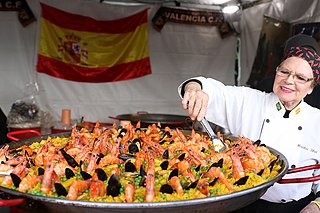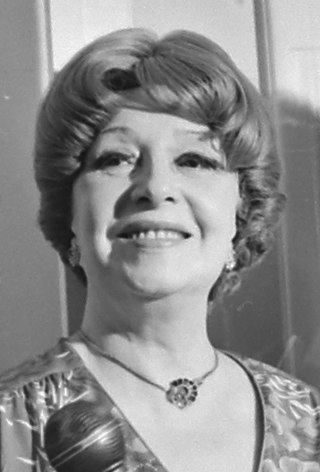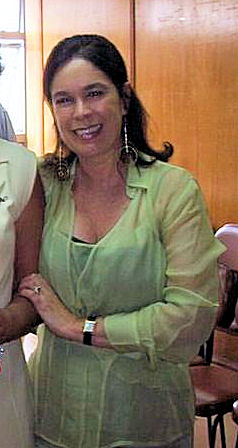
Nélida Piñon (3 May 1937 – 17 December 2022) was a Brazilian author and professor. At the time of her death, Piñon was "considered among the foremost writers in Brazil today". [1]

Nélida Piñon (3 May 1937 – 17 December 2022) was a Brazilian author and professor. At the time of her death, Piñon was "considered among the foremost writers in Brazil today". [1]
Nélida Cuiñas Piñon was born in 1937 in the middle class Vila Isabel area of Rio de Janeiro to Olivia Carmen Cuíñas Piñón, a homemaker and Lino Piñón Muíños, a merchant. Her mother was the child of Galician immigrants, her father a first generation Galician immigrant. [2]
She studied at the Catholic University of Rio de Janeiro before working as a journalist for the newspaper O Globo and the magazine Cadernos Brasileiros. She has taught writing in workshops and at institutions including Columbia University, Johns Hopkins and the University of Miami, where she has been the Stanford Professor of Humanities. [1]
Her first novel was Guia-Mapa de Gabriel Arcanjo (The Guidebook of Archangel Gabriel), written in 1961, it concerns a protagonist discussing Christian doctrine with her guardian angel. In the 1970s, she became noted for erotic novels A casa de paixão (The House of Passion) and A força do destino (The Force of Destiny), written in 1977.[ page needed ]
In 1984, she had her perhaps greatest success with A República dos Sonhos, (The Republic of Dreams). The work involves generations of a family from Galicia, who emigrated to Brazil, which relates to her own family's experience.
Among other distinctions, Piñon was awarded the 1995 FIL Award and the 2005 Prince of Asturias Award for literature. She also was the President of Academia Brasileira de Letras (Brazilian Academy of Letters) from 1996 to 1997, and occupied the José Bonifácio Chair of Iberoamerican Affairs of the University of São Paulo in 2015. She received the Spanish citizenship in 2021 by the Royal Decree. [3]
Piñon died on 17 December 2022, at the age of 85, in Lisbon. [4] [5]
| Library resources about Nélida Piñon |
| By Nélida Piñon |
|---|

Hilda de Almeida Prado Hilst was a Brazilian poet, novelist, and playwright. Her work touches on the themes of mysticism, insanity, the body, eroticism, and female sexual liberation. Hilst greatly revered the work of James Joyce and Samuel Beckett, and the influence of their styles—like stream of consciousness and fractured reality—is evident in her own work.

Spanish Brazilians are Brazilians of full or partial Spanish ancestry.

Lygia Fagundes da Silva Telles was a Brazilian novelist and writer. Educated as a lawyer, she began publishing soon after she completed high school and simultaneously worked as a solicitor and writer throughout most of her career. She was a recipient of the Camões Prize, the highest literary award of the Portuguese language and her works have received honors and awards from Brazil, Chile and France. She was elected as the third woman in the Brazilian Academy of Letters in 1985 and held Chair 16.

Moacyr Jaime Scliar was a Brazilian writer and physician. Most of his writing centers on issues of Jewish identity in the Diaspora and particularly on being Jewish in Brazil.

João Ubaldo Ribeiro was a Brazilian writer, journalist, screenwriter and professor. Several of his books and short stories have been turned into movies and TV series in Brazil. Ribeiro was a member of the Brazilian Academy of Letters, being elected in 1994. At the time of his death many considered him to be Brazil's greatest contemporary novelist.

Rachel de Queiroz was a Brazilian author, translator and journalist.

Lídia Jorge is a prominent Portuguese novelist and author whose work is representative of a recent style of Portuguese writing, the so-called "Post Revolution Generation".
Helen Lane was an American translator of Spanish, Portuguese, French and Italian language literary works into English. She translated works by numerous important authors including Jorge Amado, Augusto Roa Bastos, Marguerite Duras, Juan Goytisolo, Mario Vargas Llosa, Curzio Malaparte, Juan Carlos Onetti, Octavio Paz, Nélida Piñon, and Luisa Valenzuela. She was a recipient of the National Book Award.

Joaquim Lúcio Cardoso Filho, known as Lúcio Cardoso, was a Brazilian novelist, playwright, and poet.

Júlia Valentina da Silveira Lopes de Almeida was one of the first Brazilian women to earn acclaim and social acceptance as a writer. In a career that spanned five decades, she wrote in a variety of literary genres; however, it is her fiction, written under the influence of the naturalists Émile Zola and Guy de Maupassant, that has captured the attention of recent critics. Her notable novels include Memórias de Marta, the first Brazilian novel to take place in an urban tenement, A Família Medeiros, and A Falência. Immensely influential and appreciated by peers like Aluísio Azevedo, João do Rio and João Luso, she is remembered as an early advocate of modernized gender roles and increased women's rights, as a precursor to later women writers like Clarice Lispector, and for her support of abolition. She was married to the poet Filinto de Almeida.

The São Paulo Prize for Literature is a Brazilian literary prize for novels written in the Portuguese language and published in Brazil. It was established in 2008 by the Secretary of Culture for the State of São Paulo. Though not as old as other literary prizes in Brazil, such as the Machado de Assis Prize, the São Paulo Prize has quickly risen in prestige. For example, in 2011, there were 221 submissions for the prize. This rapid rise in popularity is partly because of the large cash prize. Every year two prizes of R$200,000 each are awarded—one for the best novel of the year by an established author, and the other for the best novel of the year by a debut author—making the São Paulo Prize the largest prize for a published work in Brazil, and one of the largest literary prizes in the world. Ten finalists are listed for each award, during the Festival da Mantiqueira, and the winners are announced on the first Monday of August in the Museum of the Portuguese Language.

Eugênia Álvaro Moreyra was a Brazilian journalist, actress and theater director, who became president of the professional theater union. A feminist pioneer, she was a leader of the suffrage campaign in Brazil. She was also linked to the Brazilian modernist movement and was a staunch defender of Communist ideals. She was married to the poet and writer Álvaro Moreyra, who played a major role in the renewal of the Brazilian theater, organizing cultural popularization campaigns and working as an actress, director, translator, declaimer and later president of the union of theater professionals.

Lêdo Ivo was a Brazilian poet, novelist, essayist and journalist. He was member of the Brazilian Academy of Letters, elected in 1986.

Dinah Silveira Ribeiro, was a Brazilian writer of novels, short stories, and chronicles. She received the Machado de Assis Prize.

Beatriz Bracher is a Brazilian writer.

Mary Lucy Murray Del Priore is a Brazilian historian and teacher. She wrote several books on the history of everyday Brazilian people during the colonial, imperial and Republican periods.

Elizabeth Milan Mangin, known as simply Betty Milan, is a Brazilian Lacanian psychoanalyst who became an essayist, a novelist and a playwright.
Gerardo Majella Mello Mourão was a Brazilian poet, fictionist, politician, journalist, translator, essayist and biographer, considered a key figure in both the national and all Lusophone literature.

Heloísa Teixeira, formerly known as Heloísa Buarque de Hollanda is a Brazilian writer, essayist, editor and literary critic. Her research activity focuses on the relationship between culture and development, particularly with regard to poetry, feminism, gender and ethnic relations, marginalized cultures, and digital culture.

Alberto Mussa is a Brazilian writer and translator.